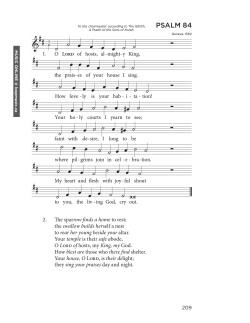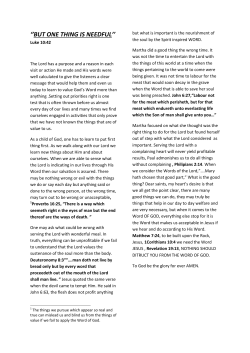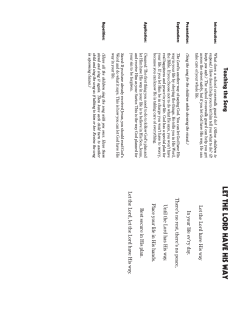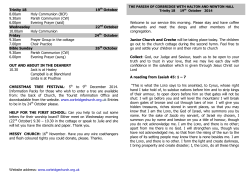
Nityam Bhagavata Sevaya - Issue 11 - ebooks
Çré Mohiné Ekädaçé Issue no: 11 29th April 2015 The unalloyed devotion of Bhakta Prahlada FEATURES PRAHLADA MAHARAJA IS THE SUPREME DEVOTEE His Divine Grace A.C.Bhaktivedanta Swami Prabhupada NINE PROCESSES OF DEVOTIONAL SERVICE Srila Bhaktisiddhanta Sarasvati Thakur WHEN KRISHNA IS NOT PRESENT THE DEVOTEE IS PRESENT SrilaVishvanatha Chakravarti Thakur THE SPECIAL MERCY ON PRAHLAD MAHARAJA Srila Madhvacharya ÇRÉ NÅSIÀHÄÑÖAKAM Srimad Paramahamsat Yati Jiyar PRAYERS TO LORD NARSIMHADEV Srila Sukadev Goswami Issue no 11, Page — 2 Prahlada Maharaja is the Supreme Devotee His Divine Grace A.C.Bhaktivedanta Swami Prabhupada Prahlada Maharaja is the vivid example of a great person fully absorbed in Krishna consciousness. In Caitanya-caritämåta (Madhya 8.274) it is said: sthävara-jaìgama dekhe, nä dekhe tära mürti sarvatra haya nija iñöa-deva-sphürti A fully Krishna conscious person, although situated in this material world, does not see anything but Krishna, anywhere and everywhere. This is the sign of a mahä-bhägavata. The mahä-bhägavata sees Krishna everywhere because of his attitude of pure love for Krishna. As confirmed in the Brahma-saàhitä (5.38): premäïjana-cchurita-bhakti-vilocanena santaù sadaiva hådayeñu vilokayanti yaà çyämasundaram acintya-guëa-svarüpaà govindam ädi-puruñaà tam ahaà bhajämi nityaà bhägavata-sevayä "I worship the primeval Lord, Govinda, who is always seen by the devotee whose eyes are anointed with the pulp of love. He is seen in His eternal form of Shyamasundar, situated within the heart of the devotee." An exalted devotee, or mahätamä, who is rarely to be seen, remains fully conscious of Krishna and constantly sees the Lord within the core of his heart. It is sometimes said that when one is influenced by evil stars like Saturn, Rahu or Ketu, he cannot make advancement in any prospective activity. In just the opposite way, Prahlada Maharaja was influenced by Krishna, the supreme planet, and thus he could not think of the material world and live without Krishna consciousness. That is the sign of a mahä-bhägavata. Even if one is an enemy of Krishna, a mahä-bhägavata sees him to be also engaged in Krishna's service. Another crude example is that everything appears yellow to the jaundiced eye. Similarly, to a mahä-bhägavata, everyone but himself appears to be engaged in Krishna's service. Prahlada Maharaja is the approved mahäbhägavata, the supreme devotee. He had natural attachment (naisargiké ratiù). Although Prahlada Maharaja was only a boy, he had no interest in playing. As stated in Çrémad-Bhägavatam (11.2.42), viraktir anyatra ca: the symptom of perfect Krishna consciousness is that one loses interest in all material activities. For a small boy to give up playing is impossible, but Prahlada Maharaja, being situated in first-class devotional service, was always absorbed in a trance of Krishna consciousness. Just as a materialistic person is always absorbed in thoughts of material gain, a mahä-bhägavata like Prahlada Maharaja is always absorbed in thoughts of Krishna. —Çrémad-Bhägvatam (Bhägavata Puräëa) » Canto 7 » Chapter 4: Hiraëyakaçipu Terrorizes the Universe » Verse: 37, Purport · Nine Processes Of Devotional Service Srila Bhaktisiddhanta Sarasvati Thakur The word çravaëa refers to giving aural reception to the holy name and descriptions of the Lord's form, qualities, entourage and pastimes as explained in Çrémad-Bhägavatam, Bhagavad-Gétä and similar authorized scriptures. After aurally receiving such messages, one should memorize these vibrations and repeat them (kértanam). Smaraëam means trying to understand more and more about the Supreme Lord, and päda-sevanam means nityaà bhägavata-sevayä Issue no 11, Page 3 Prahlada Maharaja praising the nine processes of devotional service to his father Hiranyakashipu engaging oneself in serving the lotus feet of the Lord according to the time and circumstances. Arcanam means worshiping Lord Vishnu as one does in the temple, and vandanam means offering respectful obeisances. Man-manä bhava mad-bhakto madyäjé mäà namaskuru [Bg. 18.65]. Vandanam means namaskuru—offering obeisances or offering prayers. Thinking oneself to be nitya-krsna-däsa, everlastingly a servant of Krishna, is called däsyam, and sakhyam means being a well-wisher of Krishna. Krishna wants everyone to surrender unto Him because everyone is constitutionally His servant. Therefore, as a sincere friend of Krishna, one should preach this philosophy, requesting everyone to surrender unto Krishna. Ätma-nivedanam means offering Krishna everything, including one's body, mind, intelligence and whatever one may possess. One's sincere endeavor to perform these nine processes of devotional service is technically called bhakti. One should not be like the karmés, who perform pious activities and then formally offer the results to Krishna. That is karma-käëòa. One should not aspire for the results of his pious activities, but should dedicate oneself fully and then act piously. In other words, one should act for the satisfaction of Lord Vishnu, not for the satisfaction of his own senses. —From Ananta-gopala Tathya, Srila Bhaktisiddhanta Sarasvati Thakur's commentary on Çrémad-Bhägvatam. · Issue no 11, Page — 4 When Krishna Is Not Present The Devotee Is Present SrilaVishvanatha chakravarti thakur çré-hiraëyakaçipur uväca he durvinéta mandätman kula-bheda-karädhama stabdhaà mac-chäsanodvåttaà neñye tvädya yama-kñayam Translation: Hiranyakashipu said: O most impudent, most unintelligent disruptor of the family, O lowest of mankind, you have violated my power to rule you, and therefore you are an obstinate fool. Today I shall send you to the place of Yamaraja. Hiranyakashipu condemned his Vaishnava son Prahlada for being durvinéta- ungentle, uncivilized, or impudent. Durvinéta’s meaning is derived by the mercy of the goddess of learning, Sarasvati. Duù refers to this material world. This is confirmed by Lord Krishna in His instruction in Bhagavad-Gétä that this material world is duùkhälayam, full of material conditions. Vi means viçeña, "specifically," and néta means "brought in." By the mercy of the Supreme Lord, Prahlada Maharaja was especially brought to this material world to teach people how to get out of the material condition. Lord Krishna says, yadä yadä hi dharmasya glänir bhavati bhärata [Bg. 4.7]. When the entire population, or part of it, becomes forgetful of its own duty, Krishna comes. When Krishna is not present the devotee is present, but the mission is the same: to free the poor conditioned souls from the clutches of the maya that chastises them. Further the word mandätman means manda—very bad or very slow in spiritual realization. As stated in Çrémad-Bhägavatam (1.1.10), mandäù sumanda-matayo mandabhägyä. Prahlada Maharaja is the guide of all the mandas, or bad living entities who are under the influence of maya. He is the benefactor even of the slow and bad living entities in this material world. Kula-bheda-karädhama: by his actions, Prahlada Maharaja made great personalities who established big, big families seem insignificant. Everyone is interested in his own family and in making his dynasty famous, but Prahlada Maharaja was so liberal that he made no distinction between one living entity and another. Therefore he was greater than the great prajapatis who established top right 3 nityaà bhägavata-sevayä their dynasties. The word stabdham means obstinate. A devotee does not care for the instructions of the asuras. When they give instructions, he remains silent. A devotee cares about the instructions of Krishna, not those of demons or nondevotees. He does not give any respect to a demon, even though the demon be his father. Mac-chäsanodvåttam: Prahlada Maharaja was disobedient to the orders of his demoniac father. Yama-kñayam: every conditioned soul is under the control of Yamaraja, but Hiranyakashipu said that he considered Prahlada Maharaja his deliverer, for Prahlada would stop Hiranyakashipu's repetition of birth and death. Because Prahlada Maharaja, being a great devotee, was better than any yogi, Hiranyakashipu was to be brought among the society of bhakti-yogis. Thus Srila Vishvanatha Cakravarti Thakura explains these words in a very interesting way as they can be interpreted from the side of Sarasvati, the mother of learning. —From 'Sarartha darshini', Srila Vishvanatha Chakravarti Thakur's commentary on Çrémad-Bhägvatam · The Special Mercy On Prahlada Maharaja Srila Madhvacharya The goddess of fortune, the mother of the universe, could not get mercy similar to that which was offered to Prahlada Maharaja, for although the goddess of fortune is always a constant companion of the Supreme Lord, the Lord is more inclined to His devotees. In other words, devotional service is so great that when it is offered even by those born in low families, the Lord accepts it as being more valuable than the service offered by the goddess of fortune. Lord Brahma, King Indra and the other demigods living in the upper planetary systems are situated in a different spirit of consciousness, and therefore they are sometimes troubled by demons, but a devotee, even if situated in the lower planets, enjoys life in Krishna consciousness under any circumstances. parataù svataù karmataù: as he acts himself, as he is instructed by others or as he performs his material activities, he enjoys life in every respect. —From 'Bhagavata-tätparya nirëaya', Srila Madhavacharya's commentary on Çrémad-Bhägavatam · nityaà bhägavata-sevayä Top left 4 Issue no 11, Page 5 Çré Bhävärtha-Dépikä goddess of learning, and He is always embracing the goddess of fortune to His chest. The Lord is always Srila Sridhar Swami complete in knowledge within Himself. Let us offer The following verse was composed by Sridhara obeisances unto Narsimha-deva.” Swami in his commentary on the Tenth Canto of Similarly, in his commentary on the First Canto of Çrémad-Bhägavatam (10.87.1): Çrémad-Bhägavatam (1.1.1), Sridhara Swami describes Lord Narsimha-deva in this way: väg-éçä yasya vadane lakñmér yasya ca vakñasi yasyäste hådaye samvit taà nåsiàham ahaà bhaje Lord Narsimha-deva is always assisted by Sarasvati, the prahläda-hådayählädaà bhaktävidyä-vidäraëam çarad-indu-rucià vande päréndra-vadanaà harim Issue no 11, Page — 6 “Let me offer my obeisances unto Lord Narsimha-deva, who is always enlightening Prahlada Maharaja within his heart and who always kills the nescience that attacks the devotees. His mercy is distributed like moonshine, and His face is like that of a lion. Let me offer my obeisances unto Him again and again.” —From Bhävärtha-dépikä, Srila Sridhar Swami's commentary on Çrémad Bhägavatam.· Çré Nåsiàhäñöakam Srimad Paramahamsat Yati Jiyar çrémad akalanka paripürëa çaçikoöi çrédhara manohara saöäpaöakänta pälaya kupälaya bhavämbudhi nimagnaà daityavarakäla narasiàha narasiàha O Lord Narsimha, O Lord Narsimha, You are the husband of Sri, the goddess of fortune. You are the death of the greatest demon, Hiranyakashipu. I am sinking into the ocean of birth and death, O Kåpälaya, the treasure house of mercy, please protect me. päda kamalävanata pätaki janänäà pätaka davänala patatri varaketo bhävana paräyaëa bhavärti harayä mäà pähi kåpayaiva narasiàha narasiàha nityaà bhägavata-sevayä O Lord Narsimha, You are the forest fire of sins of the sinful people who bow down to Your lotus feet. You are known as Garuòa-dvaja, whose chariot flag is adorned by Garuda. O Lord Narsimha, You are the cause of creation and the best shelter. Please protect me and bestow Your mercy upon me which alone can remove the distress of birth and death. tuìga nakha-paìkti-dalitäsuravaräsåk paìka nava kuìkuma vipaìkila mahoraù paëòita nidhäna kamlälaya namaste paìkaja niñëëa narasiàha narasiàha O Lord Narsimha, Your raised nails have ripped apart the great demon, Hiranyakashipu. The blood that squirted out made Your chest wet and made it look like as if fresh kuàkum was applied on You. O Lord Narsimha, You are the shelter of the best persons including Kamala, the goddess of fortune. You always dwell in Your abode which resembles a lotus flower. I offer my obeisances unto You. mauliñu vibhüñaëam iva maravaräëäà yogihådayeñu ca çirassu nigamänäm räjad aravinda ruciraà padayugaà te dehi mama murdhni narasiàha narasiàha nityaà bhägavata-sevayä O Lord Narsimha, O Lord Narsimha, please keep Your illuminating lotus feet on my head which are placed as ornaments on the helmets of the demigods, in the hearts of the yogis and on the nigamas, the Vedic scriptures. varijä vilocana mad antima daçäyäà kleça vivaçékåta samasta karaëäyäm ehi ramayä saha çaraëya vihagänäà nätham adhiruhya narasiàha narasiàha O Lord Narsimha, O Lord Narsimha, O lotus eyed one, please give me Your audience along with Rama(Lakshmi), Your consort riding on the back of Garuda, the king of birds, when all my senses will be suffering in distress and I will be in my last difficulty at the time of giving up my body. häöaka kiriöavara hära vanamälä täraraçanä makara kuëòala maëéndraiù bhüñitam-açeña-nilayaà tava vapurme cotasi cakästu narasiàha narasiàha O Lord Narsimha, O Lord Narsimha, Your transcendental body, which is the ultimate shelter of everything, is decorated with a beautiful golden crown, a forest garland, shark like earrings, various excellent jewels and an out projecting wide tongue. Let this form illuminate my mind. indu ravi pävaka vilocana rämäyaù mandira mahäbhuja lasadvara rathäìga sundara ciräya ramatäà tvayi mano me nandita sureça narasiàha narasiàha O Lord Narsimha, O beautiful One, let my mind always be engaged in enjoying Your form. The sun, the moon and the fire are Your eyes and Your strong arm is beautified by a huge wheel. O Lord Narsimha, You are the only shelter of goddess Rama(Lakshmi) and You are honored even by Lord Indra. mädhava mukunda madhusüdana muräre vämana nåsiàha çaraëaà bhava natänäm Issue no 11, Page 7 kämada ghåëin nikhila käraëa nayeyaà kälam amareça narasiàha narasiàha O Lord Narsimha, O Mukunda, Madhusudana, Murari, Vamana, You are the shelter of the surrendered souls. O Lord of the demigods, cause of all causes, please do not neglect me. Kindly fulfill my desire of passing my whole life chanting Your holy names. añöakam idaà sakala pätaka bhayaghnaà kämadam açeña duritämaya ripughnam yaù paöhati santatam açeña nilayaà te gacchati padaà sa narasiàha narasiàha O Lord Narsimha, one who reads these eight prayers daily becomes free from all the fear of sinful reactions. All his desires become fulfilled, kills all his enemies and destroys all kinds of diseases. He will attain the abode of Lord Narsimha, the Lord reclining on Shesha. —This prayer was composed by Sri Vaishnava acharya : Srimad Paramahamsat Yati Jiyar.· Prayers to Lord Narshimhadev Srila Sukadev Goswami Lord Narisimhadeva resides in the tract of land known as Hari-varña. Prahlada Maharaja, the topmost devotee of the Lord, is a reservoir of all the good qualities of great personalities. His character and activities have delivered all the fallen members of his demoniac family. Lord Narsimhadeva is very dear to this exalted personality. Thus Prahlada Maharaja, along with his servants and all the denizens of Hari-varña, worships Lord Narsimhadeva by chanting the following mantra. oà namo bhagavate narasiàhäya namas tejas-tejase ävir-ävirbhava vajra-nakha vajradaàñöra karmäçayän randhaya randhaya tamo grasa grasa oà svähä; abhayam abhayam ätmani bhüyiñöhä oà kñraum. I offer my respectful obeisances unto Lord Issue no 11, Page — 8 Narsimhadeva, the source of all power. O my Lord who possesses nails and teeth just like thunderbolts, kindly vanquish our demonlike desires for fruitive activity in this material world. Please appear in our hearts and drive away our ignorance so that by Your mercy we may become fearless in the struggle for existence in this material world.May there be good fortune throughout the universe, and may all envious persons be pacified. May all living entities become calm by practicing bhakti-yoga, for by accepting devotional service they will think of each other's welfare. Therefore let us all engage in the service of the supreme transcendence, Lord Sri Krishna, and always remain absorbed in thoughts of Him. My dear Lord, we pray that we may never feel attraction for the prison of family life, consisting of home, wife, children, friends, bank balance, relatives and so on. If we do have some attachment, let it be for devotees, whose only dear friend is Krishna. A person who is actually self-realized and who has controlled his mind is perfectly satisfied with the bare necessities of life. He does not try to gratify his senses. Such a person quickly advances in Krishna consciousness, whereas others, who are too attached to material things, find advancement very difficult. By associating with persons for whom the Supreme Personality of Godhead, Mukunda, is the all in all, one can hear of His powerful activities and soon come to understand them. The activities of Mukunda are so potent that simply by hearing of them one immediately associates with the Lord. For a person who constantly and very eagerly hears narrations of the Lord's powerful activities, the Absolute Truth, the Personality of Godhead in the form of sound vibrations, enters within his heart and cleanses it of all contamination. On the other hand, although bathing in the Ganges diminishes bodily contaminations and infections, this process and the process of visiting holy places can cleanse the heart only after a long time. Therefore who is the sane man who will not associate with devotees to quickly perfect his life? nityaà bhägavata-sevayä All the demigods and their exalted qualities, such as religion, knowledge and renunciation, become manifest in the body of one who has developed unalloyed devotion for the Supreme Personality of Godhead, Vasudeva. On the other hand, a person devoid of devotional service and engaged in material activities has no good qualities. Even if he is adept at the practice of mystic yoga or the honest endeavor of maintaining his family and relatives, he must be driven by his own mental speculations and must engage in the service of the Lord's external energy. How can there be any good qualities in such a man? Just as aquatics always desire to remain in the vast mass of water, all conditioned living entities naturally desire to remain in the vast existence of the Supreme Lord. Therefore if someone very great by material calculations fails to take shelter of the Supreme Soul but instead becomes attached to material household life, his greatness is like that of a young, low-class couple. One who is too attached to material life loses all good spiritual qualities. Therefore, O demons, give up the socalled happiness of family life and simply take shelter of the lotus feet of Lord Narsimhadeva, which are the actual shelter of fearlessness. Entanglement in family life is the root cause of material attachment, indefatigable desires, moroseness, anger, despair, fear and the desire for false prestige, all of which result in the repetition of birth and death. —Çrémad-Bhägvatam (Bhägavata Puräëa) » Canto 5: The Creative Impetus » Chapter: The Prayers Offered to the Lord by the Residents of Jambüdvépa » Verse 7-14 · To subscribe for this fortnightly edition of e-magazine please email us at: nityambhagavatasevaya@gmail.com Facebook Page: https://www.facebook.com/nbsmag
© Copyright 2025









